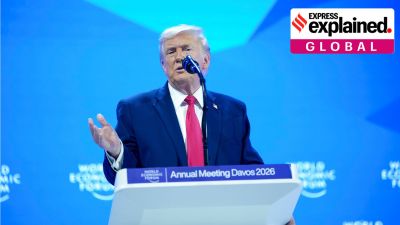Some info Bush could use
On Iraq, the Indian government has taken the politically and morally correct stand of calling for a strict implementation of the UN Security...

On Iraq, the Indian government has taken the politically and morally correct stand of calling for a strict implementation of the UN Security Council resolution with regard to Iraq8217;s weapons of mass destruction WMD. It has opposed any unilateral action by the US and UK, bypassing the UN. India holds that it is for the Iraqis to decide the legitimacy or otherwise of the Saddam Hussein government and dictate what government they should have.
If it is accepted that India has the right to acquire a military nuclear capability as a deterrent against the similar capability of China and Pakistan, how can it endorse US opposition to Iraq having a similar capability to counter Israeli capability? Can India, which opposed the nuclear hegemony and double standards of the big powers, seek to exercise a similar hegemony and practise double standards when other nations seek to acquire such weapons in their national interest?
One cannot convincingly answer these questions without going in some detail into the nature of what has come to be known as the punishment of new terrorism, which has been haunting the world since 9/11. The terrorists of this ilk, all of whom without exception so far are adherents of Islam, believe it is not only their right but a religious obligation to acquire WMD in order to protect their faith, if left with no other option. It so happens that these terrorists are inspired by Osama bin Laden and his Al Qaeda. They look upon WMD, not as a deterrence, but as a weapon of intimidation against persons practising other religions and other non-Islamic states which seek to act firmly against their terrorism.
These new terrorists are essentially products of Pakistan8217;s madrassas, where Pakistan8217;s nuclear bomb has been projected as an Islamic bomb belonging to the ummah as a whole. The concept of the right and the duty of Muslims to acquire and use nuclear weapons to protect their religion was born here, and bin Laden and his followers have merely adopted this from their Pakistani mentors like Mufti Shamzai, the chief of the Binori madrassa of Karachi. Nowhere else in the Islamic world is this concept justified.
After 9/11, India shares the concerns of US, Russia and the rest of the international community about the dangers of the nuclearisation of terrorism on Pakistani territory. If the Pakistani military establishment or rogue elements in its scientific community could blatantly transfer their nuclear weapon capability to North Korea, in utter disregard for US concerns, one can legitimately be concerned about the dangers of similar transfers to other states and non-state actors.
But even as we recognise this, we also have strong reasons to express solidarity with the people and government of Iraq in their hour of trial. No other nation in the Islamic world has been as modern, forward-looking and moderate as Iraq. No other government in the Islamic world has acted as decisively against fundamentalist and pan-Islamic elements as the Iraq government. Have you ever heard of madrassas acting as jihad factories in Iraq? Has any other government in the Islamic world been as steadfast in supporting India on the Kashmir issue as Saddam Hussein8217;s government?
In the early nineties, India decided to seek the co-operation of the intelligence agencies of the Islamic world in dealing with pan-Islamic jihadi terrorism originating from Pakistan. Only the intelligence agencies of the Najibullah government in Afghanistan, Algeria and Iraq came forward to help us. After the Mumbai blasts of March 1993, during which terrorists orchestrated by Pakistan8217;s ISI killed nearly 300 innocents, New Delhi desperately sought the help of the international community in smoking out the perpetrators of these blasts who had taken shelter in Pakistan. It received a lot of sympathy but very little concrete assistance. Only two intelligence agencies unreservedly co-operated. One of them was Iraq. India, therefore, has strong reasons to be grateful to the Iraqi government, although India has had 8212; from time to time 8212; concerns over some aspects of Iraqi policies.
India has believed since the eighties, when it became the worst victim of Pakistan-sponsored terrorism, that terrorism is an absolute evil, all the more so if it is state-sponsored. After 9/11, the rest of the world has come to share this view. But such perceptions continue to be influenced by narrow political considerations. A more glaring example of this cannot be found than in the US reluctance to act against Pakistan-sponsored terrorism, is in sharp contrast to its over-anxiety to act against Iraqi-sponsored terrorism.
There are other aspects to be considered here. US allegations of the Saddam Hussein government8217;s links with bin Laden and Al Qaeda remain unproved, but it is a fact that Iraq has had contacts with the Abu Nidal group, the anti-Teheran Mujahideen-e-Khalq and the anti-Shia/anti-Teheran Sipah-e-Sahaba Pakistan, through its militant wing 8212; the Lashkar-e-Jhangvi LEJ. India, should, therefore be concerned about the dangers of WMD finding their way from Iraq to anti-India terrorist elements. Such a possibility may be remote, we cannot ignore it.
We rightly feel angry when other nations fail to condemn acts of terrorism directed against us. Don8217;t the Americans have a similar right to feel outraged over the failure of the Saddam Hussein government to condemn 9/11? Iraq is the only one in the world not to have condemned 9/11 and conveyed its condolences over the death of US civilians.
But this does not justify any unilateral US military action against Iraq without UN endorsement. The US had acted unilaterally in the past8212;as, for instance, when it bombed Libya in 1986 after an act of terrorism directed against its nationals in West Berlin and Al Qaeda training camps in Afghanistan in August 1998, after the explosions outside its embassies in Kenya and Tanzania. But those were tactical punitive strikes and not the strategic occupation of a country, as it is now wanting to do in Iraq. India should oppose it because it is morally wrong, politically counter-productive. It could make Iraq the breeding ground for another crop of new terrorists, at a time when the world has still not come to grips with this lot.
The writer was an additional secretary, Cabinet Secretariat
- 01
- 02
- 03
- 04
- 05































